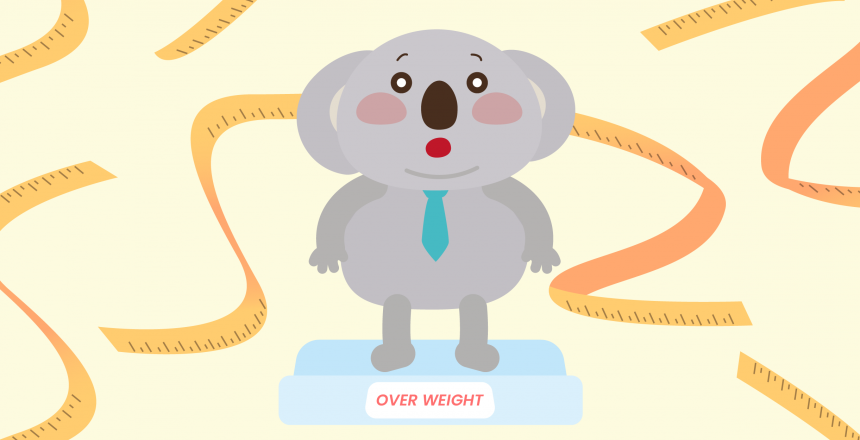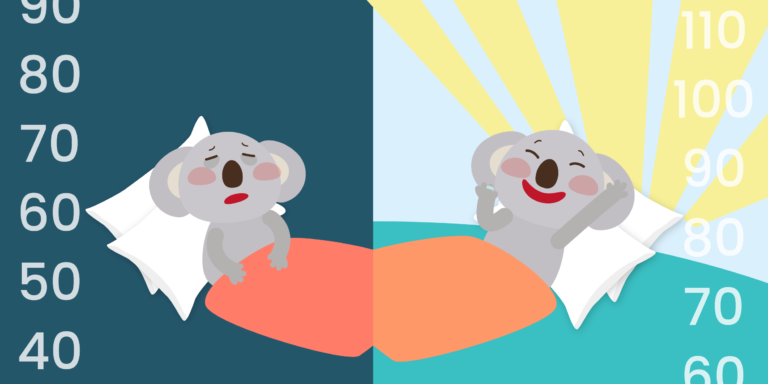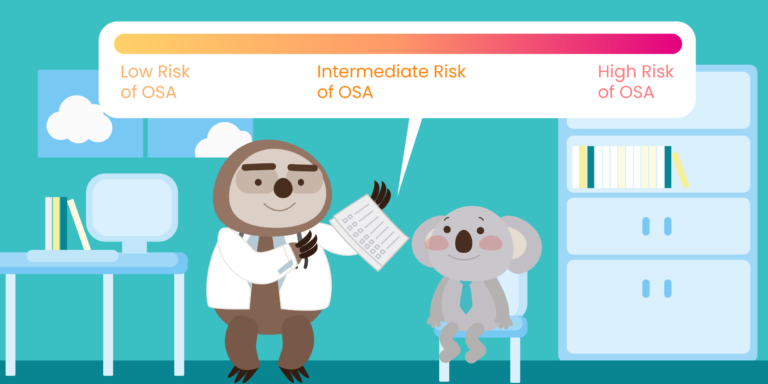What is sleep apnea and can sleep apnea cause weight gain?
If you’re considering getting diagnosed for sleep apnea, or if you’re already in the process of getting a diagnosis, you may find yourself wondering if there is a sleep apnea weight gain link. You may be wondering, ‘does sleep apnea cause weight gain’ or ‘does weight gain cause sleep apnea’?
Before we get to the answer, do you really know what sleep apnea is?
Sleep apnea is a serious sleeping disorder in which breathing is disturbed several times during the night. Sleep apnea is mainly recognized by snoring or gasping during sleep, but it is actually more than just snoring.
Should I worry about sleep apnea if I am overweight? Research by the American Heart Association says that 40% of obese people have significant sleep apnea, and about 70% of patients with obstructive sleep apnea are obese. So, if you’re overweight, the likelihood that you have sleep apnea is definitely higher!
Sleep apnea and its symptoms
Even someone who does not snore during sleep can suffer from sleep apnea. Here are some signs of sleep apnea to watch for:
- Feeling extremely tired in the morning after a full night’s sleep
- Waking up with a dry mouth
- Having frequent morning headaches
- Waking up several times during the night
- Getting chest pain during sleep
- Lacking concentration in the morning
- Falling asleep during the day
If you constantly feel extremely tired during the day and notice weight gain, this could be the ultimate reason to get diagnosed for sleep apnea as soon as possible with TipTraQ, PranaQ’s at-home sleep apnea test now!
What is the relationship between sleep apnea and weight gain?
Weight gain is considered one of the biggest risk factors for sleep apnea. According to Chadwick Denman, DDS, sleep specialist at Sleep Cycle Center, weight gain causes more tissue to be located around the throat, which can lead to sleep apnea events occurring more frequently. Extra weight causes tissue in the soft palate to collapse and causes sleep apnea events. (WebMD)
A larger tongue with more fatty tissues can prevent the muscles attached to the bone from moving the tongue away from the airway during sleep, causing sleep apnea events.
In addition to having a bigger tongue, the neck circumference of a person with extra pharyngeal fat also increases after weight gain, which can worsen sleep apnea symptoms. When the amount of pharyngeal fat increases, the upper airway passage becomes narrower, making it harder for air to pass through, causing more breathing disturbances during sleep.
Why does sleep apnea cause weight gain?
Now that we know that sleep apnea is caused by weight gain, what about the other way around? Can sleep apnea cause weight gain? The answer is yes. How does sleep apnea cause weight gain and why? Those are the questions we’ll discuss now. The short answer is that sleep apnea causes weight gain mainly due to two factors: Hormones and sleep deprivation.
1. Increase of ghrelin and decrease of leptin
Ghrelin is the hormone that can lead to increased appetite, while leptin is the hormone that can lead to decreased appetite. Sleep apnea patients usually have significantly higher ghrelin levels and lower leptin levels. This is the main reason individuals with OSA often feel hungry and want to consume more calories. (Chelsea Rohrscheib, Ph.D.)
2. Poor sleep quality hinders weight loss
An individual with sleep apnea rarely gets a good quality seven hours of sleep a night because they wake up during the night. This can cause you to be sleep deprived and hinder your ability to lose weight.
Studies show that sleep deprivation may reduce the body’s ability to lose weight efficiently. When individuals are put on the same low-calorie diet, sleep-deprived people lose 55% less weight than those who were on the same diet and had good quality of sleep (Chelsea Rohrscheib, Ph.D.)
Decreased sleep duration and inconsistent or shortened sleep patterns may reduce the chances of weight loss, according to a study published in the International Journal of Obesity (2019). Restless sleep can lead to low impulse control, increased junk food cravings, and decreased motivation to exercise.
Unstable ghrelin production and bad sleep quality can make a person feel tired all the time and reluctant to exercise, resulting in a slower metabolism. Since someone with sleep apnea tends to be less active, they burn fewer calories and may gain even more weight even if they do not eat much.
Can losing weight cure sleep apnea?
Losing weight can be the very first step in managing sleep apnea symptoms! After a sleep apnea diagnosis, many sleep specialists will recommend lifestyle changes that may include achieving a healthy body weight. One study shows that a 10% weight loss can help decrease sleep apnea symptoms by up to 26% (AHA Journal).
Is sleep apnea reversible with weight loss?
When a patient with OSA loses weight, they lose pharyngeal fat around the throat and fatty deposits on the tongue. This reduces the chance of restricted airflow. Abdominal fat loss is often associated with weight loss, which may increase lung volume and prevent the airway from collapsing during sleep.
Sleep apnea is reversible through weight loss only if your sleep apnea symptoms were worsened by weight gain to begin with. In this case, losing 10% of your body weight can have a big effect on some symptoms of sleep apnea. In some people’s cases, a large weight loss may even eliminate sleep apnea altogether.
However, if you suffer from sleep apnea despite a healthy BMI, you should be evaluated for other underlying conditions and consult your sleep doctor immediately.
Studies about sleep apnea and weight loss
The direct linkage between obesity and obstructive sleep apnea needs further research. However, obesity has been shown to increase neck and waist circumference, which is discussed as one of the main risk factors of sleep apnea. There is still much debate about how obesity can further influence the severity of sleep apnea in the future.
In the most recent study from the Sleep Heart Healthy Study report, moderate to severe obstructive sleep apnea occurs in older adults (middle-aged and older), who have higher BMI, neck circumference, and waist circumference. Research shows that an estimated 58% of patients with moderate to severe sleep apnea have all of these obesity indicators. This is the main reason long-term weight loss should be planned to reduce the likelihood of sleep apnea and its symptoms.
Weight loss may also help reduce other serious health conditions, such as:
- High blood pressure
- Stroke
- Cardiovascular diseases, such as heart attack
- Type 2 diabetes
- GERD (gastro-oesophageal reflux disease)
- Liver and kidney diseases
Can treating sleep apnea cause weight loss?
The most common method of treating sleep apnea is the use of a continuous positive airway pressure (CPAP) machine. The CPAP machine is the first choice in treatment recommended by sleep centers for patients with OSA, as it is considered one of the best sleep apnea treatments with a high success rate. The question remains, though, can treating sleep apnea help you lose weight? Let’s see.
Research conducted by the University of Arkansas discussed the effects of CPAP on weight loss programs. In a group of sleep apnea patients who received CPAP treatment and were participating in a weight loss program at the same time, patients lost an average of 5.7 pounds more than subjects from the group without sleep apnea and the group with sleep apnea who did not receive CPAP. All participants adhered to a restricted diet of up to 800 calories per day and the same exercise program. However, the CPAP group ended up losing an average of 26.7 pounds, while the other two groups lost an average of 19 – 21 pounds.
These numbers are critical in answering the question, can treating sleep apnea can help weight loss?
The main reason CPAP may help with weight loss is that CPAP helps sleep apnea patients sleep better and better sleep quality can lead to patients being able to have better control their weight, especially if they are on a weight loss program.
Although CPAP may not be the ultimate treatment for sleep apnea, sleep apnea patients are strongly encouraged to pursue CPAP or other treatments suitable for reducing the symptoms of sleep apnea during sleep.
CPAP is one way to help you sleep better, but it should also be supported by healthy sleeping habits for better results. Here are some small steps you can take for good sleep hygiene:
- Turn off all lights before bed and stay away from gadgets
- Carry out a regular exercise routine
- Try to avoid noise and light as much as possible
- Ensure a regular sleep and wake up hours
- Avoid stress as much as possible to prevent stress eating
How to diagnose sleep apnea?
Are you gaining eight and not showing any progress in losing weight even after many weight loss programs? Maybe you have been sleeping poorly and sleep apnea is the anwer to all your worries. It’s time to get a diagnosis for your sleep apnea.
Home test for sleep apnea
There are two different types of sleep apnea tests you can take: an at-home sleep apnea test and the PSG (polysomnography). While PSG requires you to take many steps before you can take overnight test in at a sleep center, you can take PranaQ’s at-home sleep apnea test in the comfort of your own home!
With an at-home sleep apnea test, you can wear the device anytime overnight or for a few days and sleep in the comfort of your own bed. With our device and your smartphone, you can check how well you slept that day at any time and soon receive the correct diagnosis for sleep apnea.
Check out PranaQ to find out how we can help you get diagnosed with sleep apnea faster and better!
References:
- https://www.webmd.com/sleep-disorders/sleep-apnea/sleep-apnea
- https://www.webmd.com/sleep-disorders/sleep-apnea/news/20140930/could-a-fat-tongue-be-a-factor-in-sleep-apnea
- https://www.ahajournals.org/doi/10.1161/01.hyp.0000101686.98973.a3
- https://www.ncbi.nlm.nih.gov/pmc/articles/PMC2645248/
- https://lowtcenter.com/news-article/sleep-apnea-treatment-help-weight-loss/
- https://www.healthline.com/health/sleep-apnea/sleep-apnea-weight-gain
- https://www.ncbi.nlm.nih.gov/pmc/articles/PMC5836788/
- https://www.sleepfoundation.org/sleep-apnea/weight-loss-and-sleep-apnea
- https://www.sleepfoundation.org/physical-health/weight-loss-and-sleep
- https://www.formhealth.co/blog/sleep-apnea-and-weight-gain/







